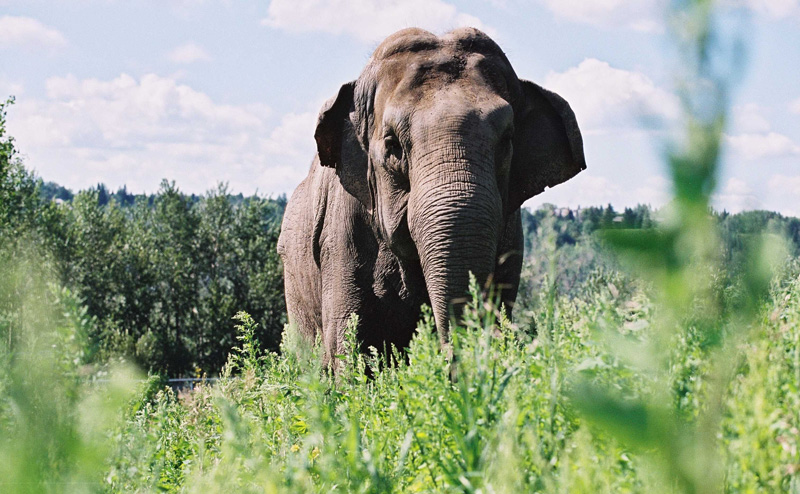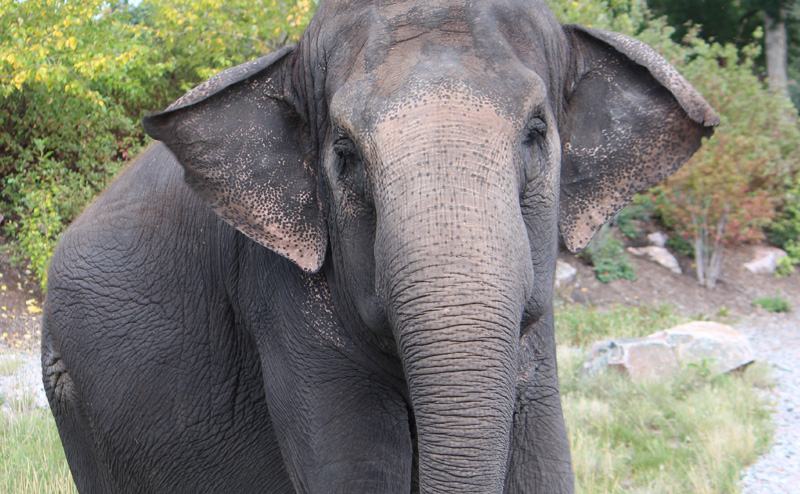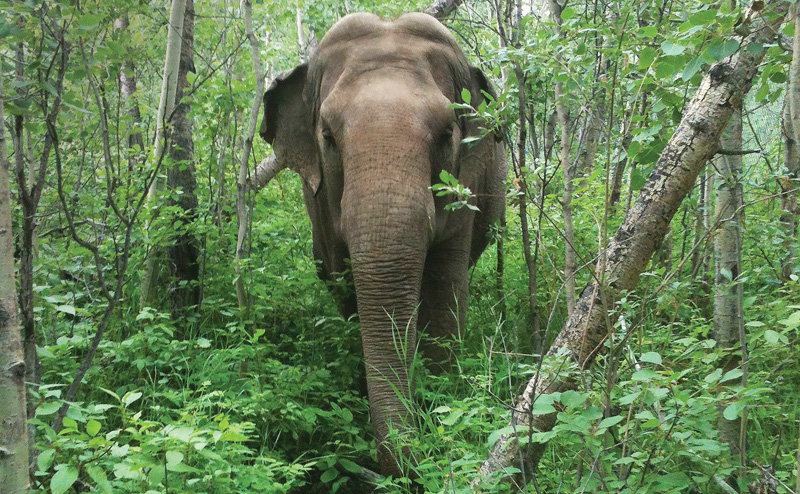Happy 50th Birthday, Lucy!
The Edmonton Valley Zoo's Asian elephant turned 50 years old on July 1, 2025.
Main page content begins here



The Edmonton Valley Zoo is home to an Asian elephant named Lucy, who has been the subject of great attention. Lucy was orphaned in Sri Lanka and was brought to the Edmonton Valley Zoo in 1977 through partnership with the Pinnawala Elephant Orphanage and Colombo Zoo.
Lucy is a beloved member of the zoo family and the Edmonton community. She is looked after by a dedicated team of animal care professionals who work tirelessly to provide her with excellent care.
The Edmonton Valley Zoo's Asian elephant turned 50 years old on July 1, 2025.
In honour of Lucy the elephant’s 50th birthday, the Valley Zoo Development Society has launched Lucy’s Legacy, a growing fund that supports global conservation partners working to protect endangered species, including Asian elephants, and helps provide vital care for animals at the Edmonton Valley Zoo.
Dr. Jennifer D'Agostino and Mr. Mike McClure - Fall, 2025
Health and Wellbeing Assessment for Asian Elephant Lucy - Dr. Jennifer D'Agostino
Edmonton Valley Zoo Elephant Assessment Report - Mr. Mike McClure
Dr. D’Agostino is the Chief Animal Programs Officer and Senior Director of Veterinary Services at the Oklahoma City Zoo and Botanical Garden. She brings a wealth of experience in clinical zoo medicine with a specialization in the care and welfare of Asian elephants. She is among the core faculty for the Association of Zoos and Aquariums (AZA) Principles of Elephant Managements Levels I and II, has served as an AZA Accreditation Inspector since 2012, and is a board member of the Elephant Manager’s Association. As a key member of the Elephant Endotheliotropic Herpes Virus (EEHV) Advisory Group, she contributes to research and innovative strategies to combat this fatal disease.
Mr. McClure has more than 35 years in senior positions managing teams and animals, including many years as a Board Member for the Elephant Managers Association, a member of the Elephant Endotheliotropic Herpes Virus (EEHV) Advisory Group, as a course administrator and instructor for the Association of Zoos and Aquariums’ Principles of Elephant Management 1 & 2 courses, and as a certified facilitator for the 6 Types of Working Genius productivity tool.
McClure International Consulting provides professional, evidence-based consultation services for projects and specified animals managed by their clients. Mr. McClure has extensive experience with a specialization in elephant foot health management. Edmonton Valley Zoo has contracted his services to evaluate and provide feedback regarding the general health, welfare, and behaviour patterns of Lucy, provide feedback on our husbandry programs and techniques, and to assess foot and joint health conditions and recommend techniques for intervention and rehabilitation over three in-person visits.
2024 Health Assessment Summary — Dr. Dennis Schmitt
2024 Health Assessment Summary — Mr. Daryl Hoffman
Dr. Schmitt specializes in elephant medicine and reproduction. He spent many years at a zoo and circuses as a head veterinarian and researcher. He was a university professor for 18 years before retiring from academia in 2014. He retired from veterinary practice in 2022 but still consults around the world. Throughout his long career, he gave more than 50 seminars and presentations. He is credited as an author of nearly 70 veterinary publications. He has served as a scientific advisory member of the Asian Elephant Species Survival Program, member of the Elephant Reproductive and Elephant Research Taxon Advisory Groups; and as a member of the International Union for Conservation of Nature’s Asian Elephant Specialist Group and a former board member of the International Elephant Foundation.
Mr. Hoffman has worked with elephants for more than 30 years as a zookeeper, and manager. Daryl is currently the Executive Director of the Elephant Managers Association (EMA) and has served on the EMA Board of Directors since 2000. Under Daryl’s leadership, this organization continues to grow. He has been an instructor at the AZA Principles of Elephant Management School since 2002 and a member of the AZA Elephant TAG/SSP Management Group since 2007. Daryl was the Curator of large mammals at the Houston Zoo for 16 years and is currently Vice-President of Living Collections at the Pittsburgh Zoo.
Edmonton Humane Society confirms zoo complies with legislation in caring for Lucy
The Edmonton Valley Zoo is deeply committed to providing lifelong, high-quality care for our resident Asian elephant, Lucy. This commitment is central to our operations, and we are excited to enhance her habitat to meet evolving wellbeing standards.
A renewal of the elephant enclosure buildings’ systems was completed in Spring 2025. This project focused on replacing electrical, mechanical, and life-safety systems to significantly improve air quality, ventilation, heating, and cooling within the indoor spaces. It also introduced ultraviolet lighting, supplemental monitoring cameras, new enrichments, an automatic hay feeder, and the introduction of a specialized sand product to allow for increased cushioning and porosity.
Planning is underway for the enhancement and expansion of Lucy’s indoor and outdoor habitats at the Edmonton Valley Zoo. A large new indoor facility including an aquatic amenity will connect to her current enclosure while the size of the adjacent yard will increase dramatically and extend to the former Grevy’s zebra habitat, providing additional naturalized areas for grazing and exploring. All enhancement decisions have been made with the goal of ensuring best care practices and the evolving needs of a geriatric elephant. Design of these new habitats is underway and construction will commence in 2026.
While the zoo hopes Lucy will be with us for a long time, the 2025 Master Plan reflects the zoo’s decision to move away from Asian elephants as a resident species.
At an appropriate time after the end of Lucy's life, the elephant habitat and holding building will be re-purposed, affecting certain future developments within the zoo.
The unknown timing of this transition impacts the overall phasing of the Master Plan. While Lucy resides at the zoo, portions of the Amur River Taiga zone cannot be fully developed, including the introduction of the Amur brown bear and the relocation of Sichuan takin.
Construction of the Care Outpost could be implemented with the elephant habitat improvements to share Lucy’s important story and educate visitors about Asian elephant conservation efforts and the zoo’s commitment to excellence in animal care throughout all life phases.
Lucy is 50 years old.
Lucy arrived at the Edmonton Valley Zoo on May 19, 1977, from the Pinnawala Animal Orphanage in Sri Lanka. As she was an orphan, she was assessed developmentally and was believed to be about two years old at that time.
The Edmonton Valley Zoo recognizes her birthday each year on Canada Day.
In the morning Lucy's care team meets to discuss her day – walk times, her meals, physical therapy, play time – all the things that she will do that day. The team does this every morning, as it is important to vary her schedule daily to ensure she is intellectually stimulated and not bored from rigid routines.
Care staff enter the building quietly in the morning to see if she is awake. They keep the lights low until she is fully awake.
When Lucy wakes up, she likes to say good morning by having her tongue rubbed. This is a common way for elephants to say hello.
Staff will also check her sand pile where she sleeps. If there is a perfect imprint of Lucy's body, they know she has had a deep sleep. This is most often the case. The elephant house also has CCTV monitors and staff review them daily. If Lucy has not had a deep sleep, her care staff will pay close attention to Lucy to see if there is a reason why she may have been disturbed.
It's important to take into consideration an elephant's size and frame when considering a meal plan.
Lucy's daily meal plan incorporates a variety of hay, herbivore pellets, and vegetables. Lucy's care team ensures she is eating a healthy diet and getting the nutrients she needs. We have recently increased the amount of browse she gets and have added young coconuts into her diet.
As elephants would need to forage in the wild, Lucy's food is put in high places, inside containers, or in various areas inside and outside of her barn so she must walk around a large area to find her food.
Lucy has fresh water to drink all day. Although Lucy has two bath tub size water containers for her drinking water, she enjoys drinking from a hose. Sometimes she wants the care staff to hold the hose for her and other times she does it on her own.
Each day Lucy goes for long walks and does a variety of exercises. Lucy's exercises help her maintain a good range of motion in her joints.
Lucy takes several walks throughout the day to exercise her muscles and stimulate her brain. This means hills and valleys to stretch all of her muscle groups; this also forms part of her physiotherapy to treat her arthritis. She does exercises with her care staff and plays games. She likes to play hide and seek where she searches the wooded area for her caregivers. When she finds them she makes an announcement with a rumble or a roar.
Lucy is very careful with her movements. When ready to back up, she will stretch her back leg out to check and see if anyone is behind her.
Usually Lucy is showered every few days, but will bathe more frequently in hot weather.
Every inch of Lucy is scrubbed with large and small brushes. When the scrubbing is complete, the zoo staff rinse her back, but she likes to rinse her front herself. If she puts the hose down, it doesn't mean she is finished rinsing! The care staff will ask her if she is done before they put away the hose.
In the cooler months, Lucy's body must be completely dry before going outside, so the staff will play games with her until she is dry and ready for her walk.
Lucy has quiet time before bed during which staff will periodically check on her. Before her care staff says good night, she has a snack. The lights are then turned off so she can peacefully sleep.
Lucy is a lucky elephant - she gets to call the whole Edmonton Valley Zoo home! She is taken for long walks in the back pasture for hours at a time. For meals and sleeping, Lucy goes back to the elephant house where the floors are heated and slanted to drain away any water or urine. Lucy has three big rooms inside her house. In one room the floors are covered with sand, and in the main room the floor has a rubberized coating.
The building is also heated from overhead with extra-large vents. The walls are textured to aid in skin care. After a bath she rubs against the walls to remove any dead skin.
She sleeps in one of the smaller rooms on a bed of sand that allows her to easily lie down and enjoy a comfortable sleep.
Lucy is a content and well-adjusted elephant with some manageable health issues, the most significant of which is a respiratory problem that makes it difficult for her to breathe at all times, and particularly when she is under stress. She breathes solely from her mouth, which is unique to her. Her breathing issue is well managed at the Edmonton Valley Zoo.
Lucy has recently been diagnosed with a large uterine tumour which is common for elephants that have not given birth. She is receiving medical treatment to reduce the size of the growth and address any possible discomfort it may be causing her.
Lucy also has arthritis. She receives excellent care in managing this condition including regular rehabilitation therapy and daily walks. Her therapy includes therapeutic laser treatments to mitigate the arthritis in her leg joints. Since this program was started in 2009, Lucy has shown steady improvement.
On her feet, Lucy has some pad defects that are the result of conformational defects – she was born pigeon-toed and bow-legged. As these issues put extra stress on Lucy's feet, her caregivers check the condition of her feet and provide regular foot care.
At 50 years of age, Lucy's health is stable and she has a fulfilling and comfortable life. However, she has a particularly complicated medical issue that must be acknowledged and responsibly managed.
Lucy has a breathing problem. Elephants usually breathe through their trunks. Lucy breathes through her mouth. Under stress, or during other times of increased need for oxygen, Lucy's ability to breathe is stretched almost beyond her capacity. It is imperative to keep her calm, quiet and properly managed to prevent any unnecessary or excessive stress.
Because of all of this, moving Lucy would be life threatening and the City of Edmonton is committed to making decisions in the best interest of Lucy.
13315 Buena Vista Road (87 Avenue)
PO Box 2359
Edmonton, Alberta T5J 2R7
Outside of Edmonton: 780-442-5311
| attractions@edmonton.ca | |
| Phone | 311 |